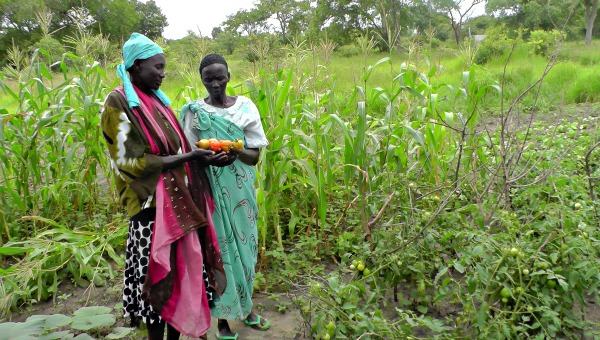
MAJIS Jesuit Farm in Akol Jal, South Sudan, provides the local population with training in sustainable agriculture and agroforestry
So much of environmental justice work is oriented towards the future; moving from the present state of environmental decline, seeking to build a better world for present and future generations. I take hope from an article written by the late John Surrette SJ called “The dream of an older Jesuit”.
Confronted by the deeply troublesome extent of planetary scale ecological destruction, John expresses concern for the future:
“I worry that later on in this century, the children and grandchildren will find themselves living within a community of life here on Earth that has a compromised future, a future in which it will be increasingly difficult for them to live with hope, find meaning, and enjoy beauty.”
He points out that we are the first generation to be fully aware of what is happening to the Earth, yet there is fragility in our knowing. Despite our awareness, we lack the evolutionary anchor and imagination to help us respond.
John shares his dream for the Society of Jesus, asking: “what is the cathedral that we Jesuits are building in this century?” He would be pleased with the renewed call for reconciliation with creation in the Decree on Mission from the 36th General Congregation of the Society of Jesus held in late 2016. Although brief, the focus reinforces Pope Francis’ message that environmental decline, social inequality and poverty are the same crisis, while reaffirming right relationships with creation as fundamental to a just relationship with each other, with God, and to the Jesuit mission. The Decree’s call rightly identifies the crux of the problem (“the flawed way societies and economies are organised”, “the current economic system with its predatory orientation”), and names where transformation is required (“the direction of development must be altered”, “a new way of producing and consuming, which puts God’s creation at the centre”, “changing our personal and community lifestyles”, “remaining close to the vulnerable”).
If we are to meaningfully respond to the complexity of these socio-ecological problems in scale, scope and interconnectedness, we need a radical social and economic transformation – but what should this transformation look like? How can we get there? Is there something unique that an Ignatian response can offer in helping us discern the path ahead? How can we translate our mission, outlined for us in the GC 36 Decree, into action?
Pope Francis frequently reminds us that while words may be full of good intentions, they are empty if inconsistent with our lifestyles. Personal lifestyles matter, yet courage and commitment must also translate to the political. Highlighted in Laudato Si’, education and action are essential at averting ecological and social injustice. Jesuit educational institutions, centres and ministries can play a central role in not only dreaming, but actively advocating for a better future. However, John Surrette SJ believed that the challenge for the Society is “soul-sized”. Clearly, we need to row into the deep – a journey which will bring together all aspects of the Jesuit community.
Dreaming a future where we live in harmony with each other and with the wider communion of creation will require us to balance our view of the world as a collection of means for meeting our needs, with the realisation that the whole Earth is a realm of moral and spiritual meaning. In John Surrette’s dream, the great work of the Society of Jesus is located at the frontiers, discerning the universal good, working with others, making a religious response, transcending our paralysis to live with bravery, hope and conviction, “embedding our passionate love of humanity within an equally passionate love of Earth and its web of Life.” Our common dream for the future rests on our common ground, the Earth.
Catherine Devitt is Environmental Justice Officer at Jesuit Centre for Faith and Justice, August 2015

